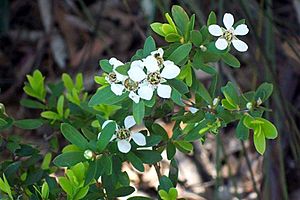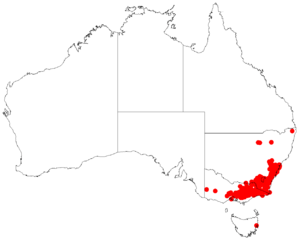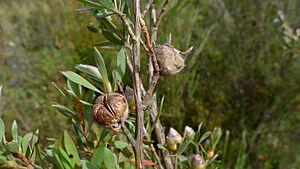Mountain tea-tree facts for kids
Quick facts for kids Mountain tea-tree |
|
|---|---|
 |
|
| Leptospermum grandifolium in Ku-ring-gai Chase National Park | |
| Scientific classification |
|
| Kingdom: | Plantae |
| Clade: | Tracheophytes |
| Clade: | Angiosperms |
| Clade: | Eudicots |
| Clade: | Rosids |
| Order: | Myrtales |
| Family: | Myrtaceae |
| Genus: | Leptospermum |
| Species: |
L. grandifolium
|
| Binomial name | |
| Leptospermum grandifolium Sm.
|
|
 |
|
| Occurrence data from AVH | |
| Script error: The function "autoWithCaption" does not exist. | |
| Synonyms | |
|
|
Script error: No such module "Check for conflicting parameters".
The mountain tea-tree, also called woolly teatree, is a type of shrub or small tree. Its scientific name is Leptospermum grandifolium. This plant is special because it grows only in south-eastern Australia.
It has leaves shaped like an oval or an egg, with a pointy tip. Its flowers are white. The fruit is round and quite large.
Contents
What the Mountain Tea-Tree Looks Like
The mountain tea-tree can be a shrub, growing about 1.5 meters (5 feet) tall. It can also be a small tree, reaching up to 10 meters (33 feet) high. Its bark is smooth and peels off in thin strips.
Its leaves are narrow and shaped like an egg or an oval. They are usually 10 to 35 millimeters (0.4 to 1.4 inches) long and 3 to 7 millimeters (0.1 to 0.3 inches) wide. The leaves often feel soft or fuzzy. They have a small, sharp point at the end and a short stem at the base.
The flowers grow one by one on short side branches. They are 12 to 18 millimeters (0.5 to 0.7 inches) wide or even bigger. At the base of the flower bud, there are wide, pale brown leaf-like parts called bracts.
The flower has a cup-like base that is 3 to 5 millimeters (0.1 to 0.2 inches) long and very hairy. The sepals, which are like small leaves protecting the bud, are egg-shaped and hairy. The petals are white and 4 to 7 millimeters (0.16 to 0.28 inches) long. The stamens, which hold the pollen, are about 3.5 millimeters (0.14 inches) long.
This plant usually flowers from October to January. Its fruit is a round capsule, 8 to 10 millimeters (0.3 to 0.4 inches) wide. The fruit stays on the plant even after it ripens, with the sepals still attached.
How it Got its Name
The mountain tea-tree was first officially described in 1802. A scientist named James Edward Smith gave it the name Leptospermum grandifolium. He wrote about it in a scientific book called Transactions of the Linnean Society of London.
Where the Mountain Tea-Tree Grows
You can find the mountain tea-tree in the eastern part of Victoria, Australia. It also grows in the Australian Capital Territory and in south-eastern New South Wales. Its northernmost point is near the Hawkesbury River.
This plant likes to grow in wet places like swamps. It can also be found along rocky streams and on sheltered hillsides. It grows from the coast all the way up to the subalpine areas of Mount Kosciuszko.
Growing Mountain Tea-Tree in Gardens
The mountain tea-tree is one of several Leptospermum species that people like to grow in their gardens. A special type of this plant, called 'Silver Sheen', is very strong. It can grow well in mild and coastal areas of the UK, even when temperatures drop to -5 degrees Celsius (23 degrees Fahrenheit). However, it needs a protected spot.
'Silver Sheen' has even won an important award. It received the Royal Horticultural Society's Award of Garden Merit. This award means it is an excellent plant for gardening.
 | James Van Der Zee |
 | Alma Thomas |
 | Ellis Wilson |
 | Margaret Taylor-Burroughs |


